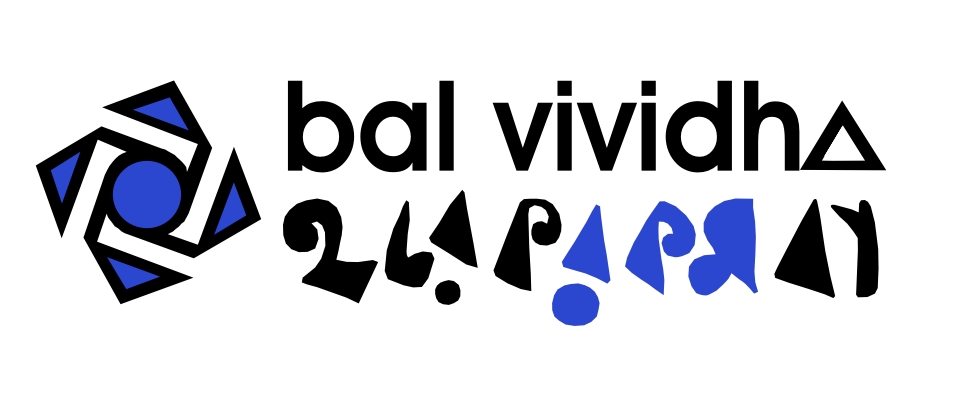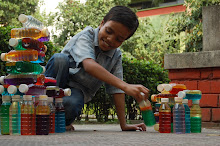11 years and 25 rounds of bal vividha
Comet Media Foundation is a non-profit organisation based at Mumbai, active since 1985. The subject of our work is a range of issues related to science, technology and society. We are involved in producing educational communication materials in print and video, training people to make their own media and in holding public events on around social concerns and themes related to science and technology. These interests have led us to experiment with varied forms of media, to evolving our own genre of educational development resource festivals called vividha.
One such festival is bal vividha,dedicated to introducing innovative approaches to education to children, teachers and parents in an interactive manner. The objective being to communicate alternative educational approaches based on experiential and constructivist pedagogies, the festival is a collective event of all the participants. It highlights their work and their perspectives and seeing a concentration of many interesting approaches at one place gives ideas and inspiration to the visitors. Most of these are approaches which one can easily adapt. They are for the most part, low-cost ingenious ideas, which bring joy to children and make them think for themselves.
This is edition 25 of bal vividha, the first edition being Children's Day of 1998. We are happy to say that this is now our eleventh year of holding such festivals. It has been a great experience for all the people who have worked on this project. When doing all the necessary networking and fund raising to put bal vividha together, we meet the most interesting people and come to know closely of their unique efforts in education.
In 2009, we are thrilled to return to Kolkata for the fourth time with bal vividha known as Harekarokamba in Bangla, following earlier editions in 2006, 2007 and 2008. We are grateful to our partners, the Birla Industrial and Technological Museum of the Government of India for consistently co-hosting this event through the years.
This year our Kolkata partner is the Development Research Communication and Services Centre. The entire process has been skilfully guided by the Secretary of the Centre, Anshuman Das and a team of colleagues held together by continuous and intense e-mail discussions and occasional face-to-face meetings. This year the festival is part an outcome of a year-round series of events.
At the risk of leaving out some people, I'd like to make special mention of Subha Das Mollick who organised the portable children's film festival Shobdo Kolpo Bhrom, a popular success, still available on request to any school or children's group; Malini Mukherjee who has organised the opening Colloquium of the festival, on the theme Education for Sustainable Development; Gitanjali Ghosh, who has done all the workshops once again, balancing the distribution of topics, resource persons and profiles of participants in a salubrious way; Sayanti Mukherji who has worked very hard to raise funds through the donation of art by artists and their subsequent sale; and Anando Mukherjee who will be holding together the Rangmanch stage with his organising of the groups doing the programmes and his engaging compering for the fourth time around. Raising funds is always tough, but this year has been especially so, due to the recession, when many of our regular donors have not been able to contribute. The fact that this team has steered the festival into being is itself a great achievement under the circumstances.
Many of the team are participating in it for the second, third and fourth time and their steadfastness shows that this is what they really enjoy. They have created this wonderful event with barely any infrastructure, using their mobile phones and e-mail accounts as their offices. We also express our thanks to the organising committee, who have been generous in supporting the team's efforts with suggestions and material contributions, giving us a tremendous sense of security. Despite in the potential for chaos with so many collaborators, the Kolkata bal vividha event has built itself through the combined experience of all these dedicated people and has acquired its own regional flavour and following of people who contribute, participate and visit repeatedly every year.
Since 2005, Comet as an organisation has been drawn to increasingly the ubiquitous Information Communication Technologies (ICTs), based on our activities the past many years. ICTs represent the possibility that everyone with access to the tools can become a participating learner and get access to vast reserves of knowledge. This is a particularly exciting prospect in a society where adequate libraries and laboratories do not exist in most communities and institutions.
Apart from the educational communication aspect, computers and the Internet provide scope for collaborative learning. Learners can become communicators, putting across their thoughts and experiences to the world. This opens up a new channel for teachers, NGO workers, artists, lawyers and others involved in public activities ― to produce and disseminate their own content instead of waiting for “professional” communicators such as journalists or film makers to do it for them or media such as newspapers or TV channels to reach their content to the public.
Yet there is a troubling paradox: while national and international policy supports the proliferation of ICTs (for governance, health, education, area resource mapping and other such beneficial applications), the widespread understanding of technology by decision makers and implementers is equipment-centred. It is based on an idea of education as an object sanctioned by authority and to be parroted by the recipients.
Our objective is quite the opposite: creativity, critical thinking, democratic discourse and the opening of entrepreneurial avenues. It is not merely about installing machines and training people to operate them, but about being able to pull them apart and do new things with them. we explore, we realise that the potential for creativity in the ICT area cannot be realised if the playing field is restricted by copyrights and so we were drawn to the free software movement, from which we have drawn resources for our ICT or New Media work.
We conduct skill-building workshops with practitioners from various areas of social activism such as human rights, women's rights, environmental activism, as well as HIV-positive self-help groups, school teachers and disabled people, to build curricular materials and a base of experience and contacts with would-be participant organisations for an institute called COSMOS which we propose to start.
Comet is keen to hear from interested people who would like to collaborate or share their thoughts with us in both the movement to take ICTs based on free software into the hands of teachers and students and in holding festivals celebrating joyful learning and liberation from the burdens of education by rote. Please visit us at www.cometmedia.org and drop us a line at cometmediafdn@gmail.com.
Chandita Mukherjee, Director, Comet Media Foundation
Sunday, August 23, 2009
Subscribe to:
Post Comments (Atom)



No comments:
Post a Comment